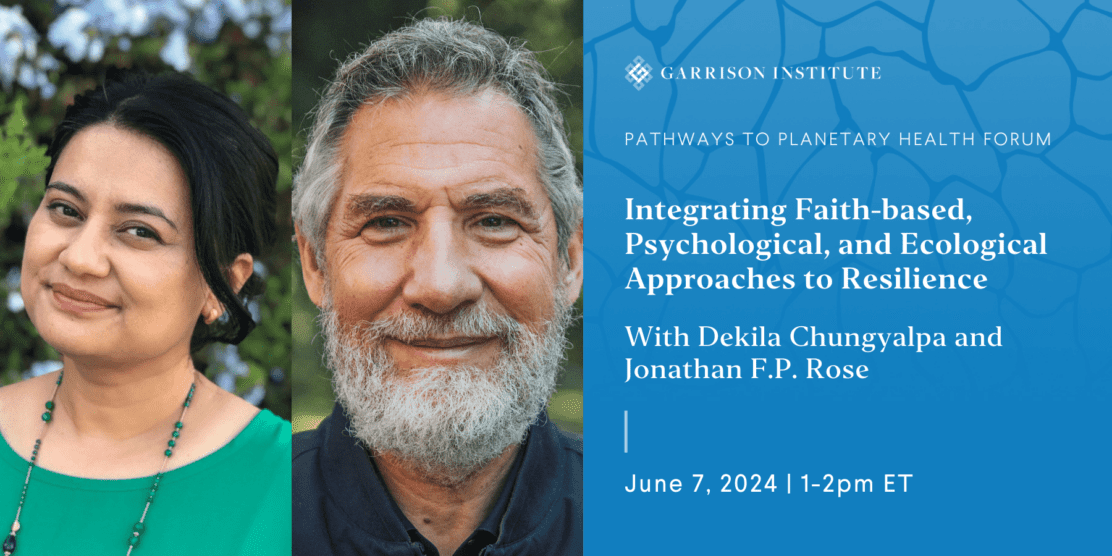Integrating approaches to resilience
On Friday, June 7th, 2024, Dekila Chungyalpa joined Garrison Institute co-founder Jonathan F.P. Rose for a conversation hosted by Pathways to Planetary Health on Integrating Faith-Based, Psychological, and Ecological Approaches to Resilience.
Dekila brought deep insights from her work in research and advocacy related to resilience and human wellbeing. She is founder and director of the Loka Initiative and has experience in designing and implementing global environmental strategies and projects.
In this conversation, Dekila shared about her innovative work in faith-led environmental and climate partnerships, biodiversity landscape and river basin strategy design, and community-based conservation.
Dekila and Jonathan discussed different forms of resilience – personal, communal, and planetary – and the role of each in helping humanity withstand our current polycrisis. Dekila’s upbringing in the Himalayan region of Sikkim informed her work toward a circular economy, solidified a sense of human identity as one with nature, and motivated efforts to reintroduce reciprocity and communal values as alternatives to capitalist consumerism.
The conversation delved poignantly into interpersonal and societal challenges that drive current sociopolitical patterns, such as a modern loneliness epidemic, climate denialism, and the epigenetic effects of historical injustices. While the symptoms of these issues appear disparate, they share a link to the many ways in which individuals and communities instill belonging and handle shared identities in challenging times.
Navigating these issues has led Dekila to hold dialogues among climate scientists and prominent faith leaders, deeply examine the attributes of resilient communities, and study the psychological effects of climate and ecological collapse among diverse people.
Many Western societies have been deeply impacted by a breakdown of many forms of resilience through capitalism, colonialism, and ecological collapse. Dekila discussed how teachings from Buddhism and other Eastern cultures may offer pathways for increased resilience, while highlighting the risks of watering these ideas down to soothe distress without addressing underlying injustices.
Joy and wonder for the world around us can still abound in challenging times and are a necessary companion for a more resilient planet.
Today’s predicaments can be approached with a worldview infused with unrelenting joy, even while they call for serious introspection and realignment. Dekila highlighted the ability for humanity at large to retrace our steps – be that through elections, at the individual level, or otherwise – as a way of resurfacing prosperity and meaning in life. Jonathan also noted how this joy can be palpable across various communities and central to the human experience.
This online event was part of a continuing series, the Garrison Institute’s Pathways to Planetary Health Forum.
Additional resources:
Dekila is hosting an upcoming course on The Psychology of Deep Resilience: Addressing Ecoanxiety and Climate Distress for Individual, Social and Ecological Well-being.
The Sacred Wisdom, Sacred Earth documentary (film teaser available here) tells the story of the Great Lakes and the relationship Native peoples had, have, and will have with the lands and waters of this sacred place.
The Yale Center for Environmental Justice is hosting an Environmental Joy Conference again in 2024, asking how centering joy shifts the solutions available to create change, resilience, and thriving.
Creation at the Crossroads provides training to pastors and church leaders in the U.S. working on climate change and creation care as critically important gospel issues.
